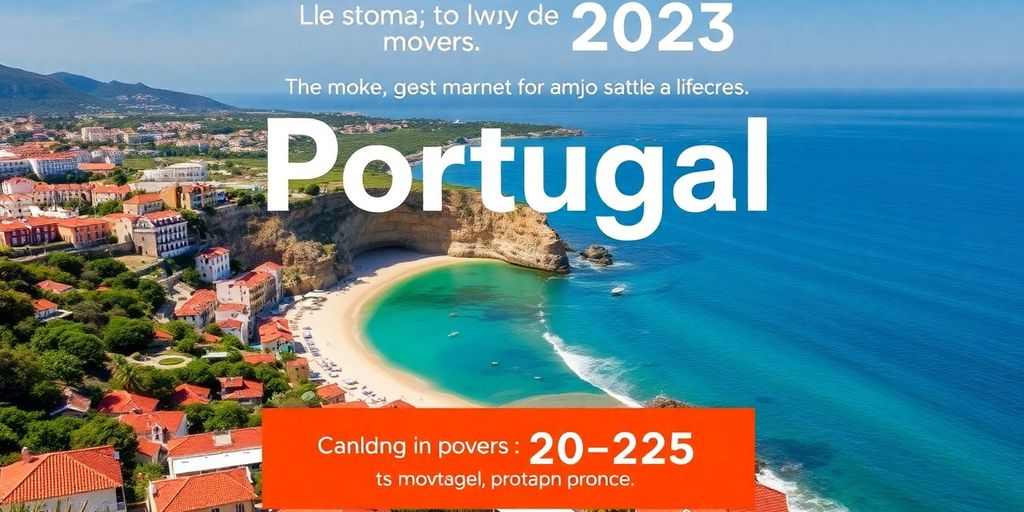
Exploring the Pros and Cons of Moving to Portugal in 2025
Thinking about moving to Portugal in 2025? You’re not alone! Many people are drawn to this beautiful country for its stunning landscapes, rich culture, and relaxed lifestyle. But before you pack your bags, it’s important to weigh the pros and cons of moving to Portugal. This article will help you understand what to expect when relocating, from the advantages to the challenges you may face.
Key Takeaways
- Portugal has a mild climate that many find appealing year-round.
- The country boasts breathtaking beaches and diverse natural scenery.
- Living in Portugal offers a high quality of life with a low crime rate.
- Language barriers can be an issue, especially in government interactions.
- Major cities can be pricey, but smaller towns offer more affordable living.
Advantages Of Living In Portugal
Portugal is becoming a hot spot for people looking to move abroad, and it’s easy to see why. From the weather to the culture, there’s a lot to love. Let’s break down some of the biggest perks.
Mild Climate
One of the biggest draws is definitely the weather. Portugal boasts a mild climate, especially compared to other parts of Europe. You can expect warm summers and mild winters, particularly in the Algarve region. Even in the winter, cities like Lisbon get a good amount of sunshine. This makes it easy to enjoy outdoor activities year-round. The northern parts of the country do get a bit colder and wetter, but overall, the climate is a major plus.
Stunning Beaches And Natural Landscapes
If you’re a nature lover, Portugal has you covered. The coastline stretches for miles, with tons of beautiful beaches. Many of these beaches have earned Blue Flag status, meaning they’re clean and well-maintained. Beyond the beaches, you’ll find mountains, vineyards, and volcanic landscapes. There’s always something new to explore, whether you’re into hiking, surfing, or just taking in the scenery. You can find places to stay all along the coast.
High Quality Of Life
Portugal consistently ranks high in quality of life surveys. This takes into account things like safety, healthcare, and environmental quality. The pace of life is generally more relaxed, which can be a welcome change if you’re coming from a busy city. Plus, the food is amazing, and the people are friendly. It’s a combination that’s hard to beat. The cost of living in Portugal is also a big factor.
Portugal offers a unique blend of affordability, safety, and natural beauty. It’s a place where you can enjoy a relaxed lifestyle without sacrificing modern amenities. The welcoming culture and rich history add to the overall appeal, making it a great place to call home.
Challenges Of Living In Portugal
Navigating The Language Barrier
While many Portuguese people, especially in tourist areas, speak some English, relying solely on it can limit your experience. Learning Portuguese will greatly enhance your daily life, from interacting with locals to understanding official documents. It’s not just about convenience; it’s about truly integrating into the culture. Even basic Portuguese phrases can go a long way in building relationships and showing respect. Don’t expect everyone to speak English fluently, especially in smaller towns or when dealing with government services. local language is important.
Cost Of Living In Major Cities
While Portugal is often touted as an affordable European destination, the cost of living in major cities like Lisbon and Porto has been steadily rising. This is especially true for housing. Expect to pay higher rents and face increased competition for apartments, particularly in popular neighborhoods. Groceries and dining out can also be more expensive in these urban centers compared to smaller towns.
- Rent in Lisbon can be significantly higher than in other parts of the country.
- Tourist areas often have inflated prices for goods and services.
- Transportation costs can add up if you rely on taxis or ride-sharing services.
Budgeting carefully and exploring options outside the city center can help mitigate these costs. Consider living in nearby suburbs or smaller towns with good transport links to the city.
Bureaucratic Hurdles
Dealing with Portuguese bureaucracy can be a test of patience. Processes often take longer than expected, and paperwork can be extensive. From obtaining residency permits to opening a bank account, be prepared for delays and potential frustrations. It’s advisable to seek assistance from a local expert or lawyer to navigate the system more efficiently.
- Applications for visas and residency can be time-consuming.
- Appointments with government agencies may be difficult to schedule.
- Understanding the required documentation can be confusing.
Cultural Benefits Of Moving To Portugal

Rich History And Heritage
Portugal’s got a seriously rich history, and you’ll see it everywhere. From ancient castles to those amazing, colorful azulejos tiles on buildings, there’s always something cool to check out. You can wander through old neighborhoods, visit historical sites, and just soak up the atmosphere. It’s like stepping back in time, but with all the modern conveniences, of course. The country is steeped in tradition, and you’ll find that the past is very much alive in the present.
Vibrant Local Cuisine
Okay, let’s talk about food. Portuguese cuisine is seriously underrated. It’s not just about amazing cuisine and wine; it’s a whole experience. Fresh seafood is a big deal, and you’ve gotta try the bacalhau (salted codfish) – it’s a national obsession. And don’t even get me started on the pastries. Pastéis de nata are a must-try, and you’ll find them in every pastelaria (pastry shop). Plus, the wine is fantastic and super affordable. Get ready to eat well!
- Seafood: Try the grilled sardines. They’re simple but delicious.
- Pastries: Pastéis de nata are a must. Seriously, you can’t leave without trying them.
- Wine: Vinho Verde is a light, refreshing option perfect for warm days.
The food culture is very social. Meals are often long, leisurely affairs shared with family and friends. It’s all about enjoying good company and savoring the flavors.
Welcoming Expat Community
One of the best things about moving to Portugal is the expat community. You’ll find people from all over the world who have made Portugal their home. It’s super easy to connect with others, share experiences, and get advice. There are tons of groups and meetups, so you won’t feel alone. Plus, the Portuguese people themselves are known for being friendly and welcoming. They’re usually happy to help you out, even if there’s a language barrier. It makes settling in a whole lot easier.
- Lots of expat groups and meetups.
- Portuguese people are generally very friendly.
- Easy to find support and advice from other expats.
Economic Factors To Consider
Job Market Overview
Okay, so you’re thinking about moving to Portugal and wondering about work? The job market can be a bit tricky, especially if you don’t speak Portuguese fluently. While there are opportunities, they might not always be in the fields you expect, or at the salary you’re used to. Tourism is a big industry, so hospitality and related jobs are often available. Tech is also growing, especially in Lisbon, but competition can be tough. It’s a good idea to start your job search online before you move, just to get a feel for what’s out there.
Cost Of Living Comparison
Let’s talk money. One of the big draws of Portugal is that it’s generally cheaper than many other Western European countries or the US. But, like anywhere, it depends on where you live and how you live. Lisbon and the Algarve are pricier than, say, the interior of the country. Groceries are generally affordable, and eating out can be quite reasonable, especially if you avoid tourist traps. Rent, however, can be a significant expense, particularly in major cities. Here’s a quick comparison:
| Expense | Portugal (Avg) | US (Avg) |
|---|---|---|
| Rent (1-bed apt) | €700-€1200 | $1500+ |
| Groceries | €200-€300 | $300+ |
| Utilities | €100-€150 | $150+ |
Keep in mind these are just averages, and your actual costs will vary. Also, remember property market fluctuations can impact housing costs.
Tax Benefits For Expats
Portugal has some interesting tax incentives for new residents, particularly the Non-Habitual Resident (NHR) regime. This can offer significant tax breaks for the first ten years of your residency, especially if you’re a freelancer or have income from abroad. However, the NHR rules have changed recently, so it’s really important to get professional advice to see if you qualify and how it will affect you. Don’t just assume it’s a slam dunk – do your homework! Also, be aware that certain goods are subject to higher taxes.
It’s worth noting that while the NHR scheme can be attractive, it’s not the only factor to consider. You should weigh the tax benefits against other aspects of living in Portugal, such as the job market, language barriers, and cultural differences. A holistic approach is key to making an informed decision.
Here are some things to keep in mind:
- Understand the NHR eligibility criteria.
- Consult with a tax advisor specializing in Portuguese tax law.
- Factor in potential changes to tax laws in the future.
Lifestyle Changes When Relocating
Moving to a new country always brings big changes, and Portugal is no exception. You’ll find yourself adjusting to a different way of doing things, from the daily routine to how you handle your health. It’s all part of the adventure, but being prepared can make the transition smoother.
Pace Of Life
One of the first things you’ll notice is the slower pace of life. Things move at a more relaxed speed here, which can be a welcome change if you’re used to a hectic environment. However, it can also be frustrating when dealing with bureaucracy or waiting for services. Embrace the calma – it’s part of the Portuguese charm. You might find yourself enjoying leisurely lunches and taking time to savor the small moments.
Healthcare System
Portugal has a pretty good healthcare system, but it works differently than in the US. Public healthcare is available, but you might experience longer wait times, especially in bigger cities. Many expats opt for private health insurance to get quicker access to doctors and specialists. It’s worth researching your options and understanding how the system works before you arrive. Overcrowding in public health centers can be a problem, so plan accordingly.
Public Transportation
Public transportation varies depending on where you live. In cities like Lisbon and Porto, you’ll find efficient metro systems, buses, and trams. However, in smaller towns and rural areas, options can be limited. If you plan to live outside a major city, consider getting a car. Even in cities, driving can be challenging due to narrow streets and limited parking. Consider these factors when choosing your location in Portugal.
Adjusting to a new lifestyle takes time and patience. Don’t expect to feel completely settled right away. Embrace the challenges, learn from your experiences, and be open to new ways of doing things. Before you know it, you’ll be feeling right at home.
Here are some things to keep in mind:
- Learn some basic Portuguese phrases. It will make everyday interactions much easier.
- Be prepared for some bureaucratic hurdles. Patience is key!
- Connect with other expats. They can offer support and advice.
Best Locations For Expats In Portugal

Choosing where to settle down is a big deal, and Portugal offers a bunch of great options for expats. It really depends on what you’re looking for – city life, beach vibes, or something in between. Let’s explore some of the top spots.
Lisbon
Lisbon is the capital, and it’s buzzing with activity. It’s a city of contrasts, blending historical charm with modern innovation. You’ll find everything from ancient castles to trendy startups. The cost of living is higher than in other parts of Portugal, especially when it comes to Lisbon real estate, but it’s still pretty affordable compared to other European capitals or major US cities. Each neighborhood has its own unique vibe, so take some time to explore and find the one that fits you best. It’s a popular spot for digital nomads, young families, and retirees alike.
Porto
Located in the north, Porto offers a different feel than Lisbon. It’s known for its port wine, stunning bridges, and historic city center (a UNESCO World Heritage site). The cost of living is generally lower than in Lisbon, making it an attractive option for those on a budget. You’ll find a strong sense of community here, and the pace of life is a bit slower. Plus, the quality of life is high. The Douro River adds to the city’s charm, and there are plenty of cultural events and activities to keep you entertained.
Algarve
If you’re dreaming of sunshine and beaches, the Algarve might be the perfect place for you. Located in the south of Portugal, it boasts a mild climate, stunning coastline, and plenty of golf courses. It’s a popular destination for tourists and expats, especially retirees. While it can get crowded during the peak season, there are still plenty of quiet corners to discover. The best places to live in Portugal often include the Algarve because of its relaxed lifestyle and beautiful scenery.
The Algarve is particularly appealing if you’re looking for a slower pace of life and enjoy spending time outdoors. The region offers a wide range of activities, from hiking and biking to water sports and exploring charming coastal towns. The expat community is well-established, making it easy to connect with others and find support.
Legal Considerations For Moving
Moving to a new country involves more than just packing your bags; it requires careful attention to the legal aspects. Portugal, while welcoming, has its own set of rules and regulations you’ll need to understand before making the leap. Let’s break down some key areas.
Visa Requirements
First things first: do you even need a visa? If you’re an EU citizen, you’re in luck – the process is much simpler. You can generally live and work in Portugal without a visa, though you’ll still need to register for residency after a certain period. For non-EU citizens, it’s a different story. You’ll need to apply for a visa that suits your situation, such as a work visa, D7 Visa (for those with passive income), or a student visa. The specific requirements vary depending on your country of origin and the type of visa you’re applying for. Make sure to start this process well in advance, as it can take several months.
Residency Permits
Once you’re in Portugal on a valid visa, your next step is usually obtaining a residency permit. This allows you to legally live in the country long-term. The process involves submitting various documents, including proof of income, health insurance, and accommodation. Be prepared for some bureaucracy – it’s a common complaint among expats. The exact requirements and procedures can change, so it’s always best to check the latest information on the official government website. Also, keep in mind that Portugal offers multiple options of obtaining residency.
Property Purchase Regulations
Thinking of buying a place in Portugal? Great! But before you sign on the dotted line, there are a few things to keep in mind.
- First, get a Portuguese tax identification number (NIF). You’ll need this for pretty much everything, including buying property.
- Second, work with a reputable real estate agent who understands the local market.
- Third, have a lawyer review the purchase agreement to make sure everything is in order.
Buying property can be a complex process, especially in a foreign country. Don’t be afraid to ask for help and do your research. It’s better to be safe than sorry when it comes to making such a big investment. Also, be aware that gentrification of certain neighborhoods has further exacerbated the issue, pushing out long-time residents and altering the social fabric of communities.
Final Thoughts on Moving to Portugal
So, is moving to Portugal in 2025 a good idea? Well, it really depends on what you’re looking for. The country has a lot to offer, like beautiful weather, friendly people, and a laid-back lifestyle. But, there are some challenges too, like the language barrier and rising costs in popular areas. If you’re ready for a change and can adapt to a new culture, Portugal could be a great fit. Just make sure to weigh the pros and cons carefully before making the leap. After all, it’s about finding the right place for you.
Frequently Asked Questions
What are the benefits of living in Portugal?
Living in Portugal offers many perks like a warm climate, beautiful beaches, and a high quality of life. It’s also affordable compared to many other European countries.
Is it difficult to find a job in Portugal?
Finding a job in Portugal can be challenging, especially in competitive fields. However, sectors like technology and tourism are growing and may offer good opportunities.
How much money do I need to live in Portugal?
To live comfortably in Portugal, you might need around €1,500 to €2,000 a month, depending on your lifestyle and where you live.
Do I need to speak Portuguese to live in Portugal?
While many people speak English, learning some Portuguese can help you connect better with locals and make daily life easier.
What is the cost of living like in Portugal?
The cost of living in Portugal is generally lower than in many Western European countries, but it can vary significantly between cities and rural areas.
What are the legal steps to move to Portugal?
If you’re not from the EU, you’ll need to apply for a visa to move to Portugal. There are different options like the D7 Visa for those with passive income.



